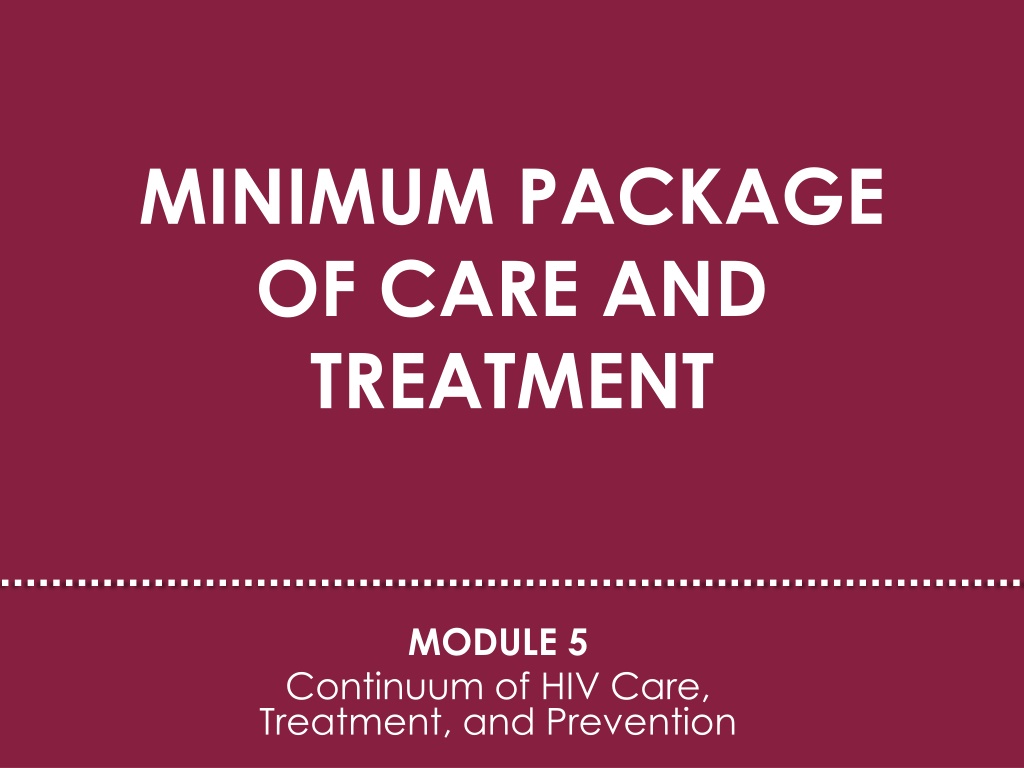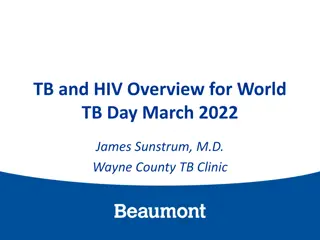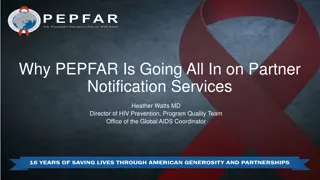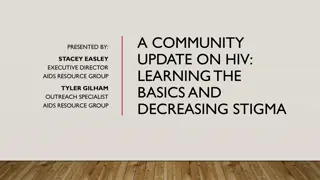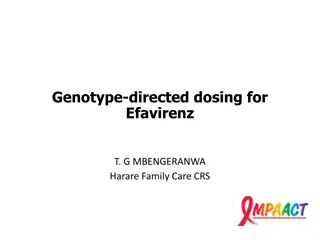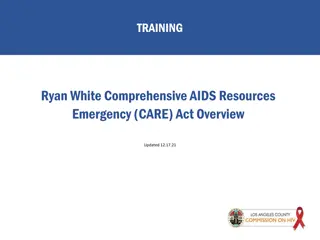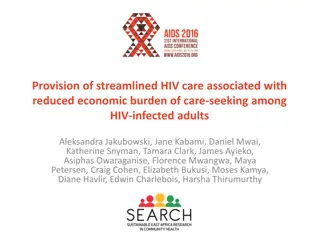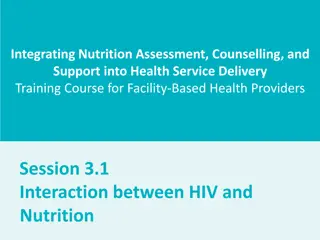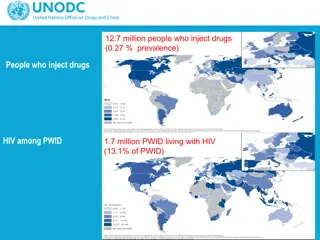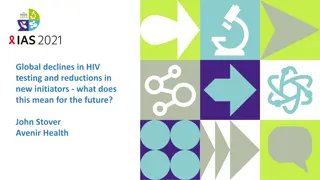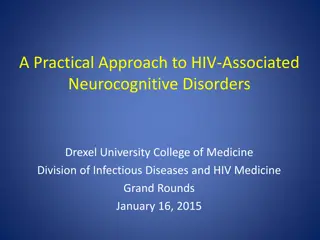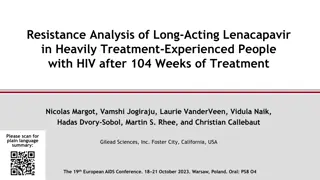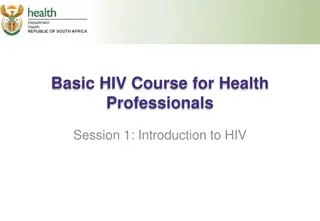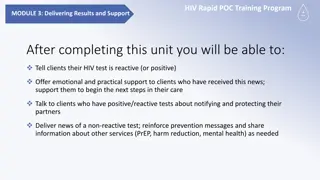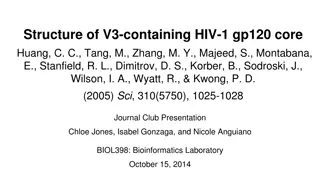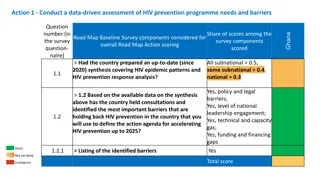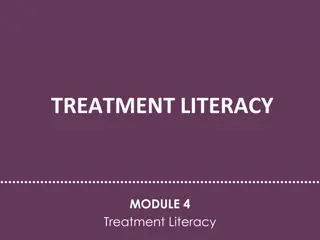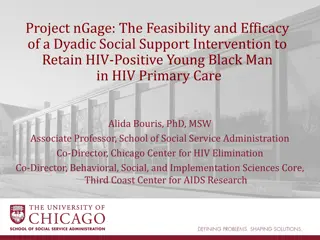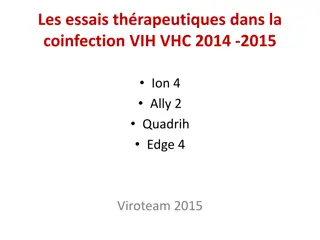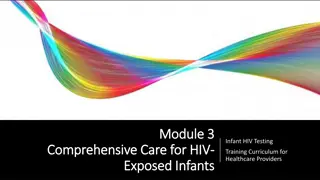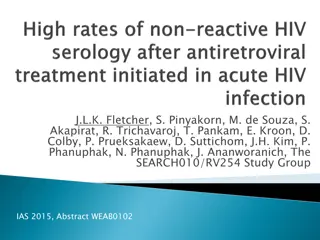Comprehensive Approach to HIV Care and Treatment
This resource provides a detailed guide on the continuum of HIV care, treatment, and prevention, covering topics such as initial evaluation of HIV-positive patients, counseling strategies, history taking, comprehensive physical examinations, and laboratory evaluations. Emphasizing the importance of adherence to medication, clinical visits, and safe practices, it aims to support healthcare professionals in providing holistic care to individuals living with HIV.
Download Presentation

Please find below an Image/Link to download the presentation.
The content on the website is provided AS IS for your information and personal use only. It may not be sold, licensed, or shared on other websites without obtaining consent from the author. Download presentation by click this link. If you encounter any issues during the download, it is possible that the publisher has removed the file from their server.
E N D
Presentation Transcript
MINIMUM PACKAGE OF CARE AND TREATMENT MODULE 5 Continuum of HIV Care, Treatment, and Prevention
INITIAL EVALUATION OF AN HIV-POSITIVE PATIENT
Initial Counselling Management of an HIV-positive patient must emphasise: 1. The need for a positive approach to life, reinforcing that HIV is not a death sentence. 2. The need to disclose their status to all sexual partners and to identify a confidant, whether friend or family member, to provide support. 3. Safe sexual practices and positive prevention. 4. The critical importance of adherence to medication, clinical visits, and investigations.
History Taking HIV history General health Drug history Sexual history Family history Occupational history Social history Review of systems
Comprehensive Physical Examination The steps outlined below should be conducted at each clinical visit: Vital signs: Temperature, pulse, respiratory rate, blood pressure. Anthropometrics: Weight, height, waist measurement. General: Pallor, body habitus (wasting, fat distribution). Oral cavity: Ulcers, thrush, poor dentition, gingival disease, pharyngeal sexually transmitted infection (STI). Dermatologic examination: The entire skin, taking particular note of conditions such as herpes zoster, folliculitis, seborrheic eczema, severe tinea corporis, abscesses, straightening and thinning of hair, BCG (Bacillus Calmette Gu rin) scar. Examine all lymph node areas: Noting any enlargements and tenderness. Breast examination: Should be offered initially, and then annually.
Comprehensive Physical Examination (cont d) Abdominal examination: Distension, obesity, and hepatosplenomegaly. Cardiovascular system: Displaced apex beat, heart sounds, elevated JVP (jugular venous pressure), ankle swelling. Respiratory system: Signs of pulmonary infiltrates, pneumothorax, pleural effusion. Muscular system: Wasting with globally decreased power, arthropathy, peripheral neuropathy. Rectal/genital examination: Noting the presence of peri-anal/genital herpes or genital warts, evidence of proctitis, anal smear for those having anal receptive intercourse. Pelvic examination: Noting vaginal discharge and cervical erosions (Pap smear). Eyes: Fundoscopy. Ear, nose, and throat: Recurrent acute sinusitis, chronic sinusitis hearing loss, vertigo. Central nervous system: paralysis, monoparesis, hemiparesis, cranial nerve abnormalities.
Laboratory Evaluation CD4 count All HIV-positive patients must have an initial CD4 count followed by three and six monthly tests until patient is virally suppressed and for staging disease and diagnosing opportunistic infections when necessary Viral load assessment should begin 6 months post-ART commencement Complete blood count (hemoglobin, white blood cell, differential, platelet) VDRL (Venereal Disease Research Laborator) or RPR (rapid plasma regain) for suspected syphilis Urinalysis HBsAg (for Hepatitis B) Anti-HCV Ab (Hepatitis C antibody) Urea and electrolytes Liver enzymes, serum proteins Fasting lipid profile Fasting blood glucose Pap smear Mantoux test Anal smears where indicated Human T-lymphotropic virus (HTLV 1)
Packages of Care in Jamaica Standard Package Enhanced Package
Psychological Assessment Assessment of treatment readiness Assessment for depression
Social Assessment Gender-based violence screening Food security Financial security
Prevention Assessment Assessment of sexual activity, provision of condoms (and lubricant), and risk-reduction counselling (if indicated). Assessment of partner status and provision of partner testing or referral. Assessment for STIs and (if indicated) provision of or referral for STI/partner treatment. Assessment of family planning needs and (if indicated) provision of contraception or safer pregnancy counselling or referral. Assessment of treatment readiness and (if indicated) support or referral. Assessment of need and (if indicated) refer or enroll people living with HIV in community-based programmes. Assessment of nutritional status for all new patients, followed by annual assessments. Annual review by contact investigators.
Medical Management Medical, psychological, and social history and physical examination (including cervical/anal examination). Baseline investigations and (as indicated) additional investigations. HIV drug resistance testing (as indicated). Opportunistic infection screening/prophylaxis/management. Antiretroviral therapy in the context of treatment readiness. Assessment for adverse events. Referral for specialist management (as indicated).
ENHANCED PACKAGE
Adolescents Living with HIV, Orphans and Vulnerable Children, Pregnant Women Living with HIV, Men Who Have Sex With Men, Commercial Sex Workers Routine enrollment in psychological care, including motivational interviewing. Routine cancer screening (cervical, ano-rectal, and prostatic cancers). Routine screening for human papillomavirus (HPV).
Serodiscordant Couples Support pre-exposure prophylaxis in the private sector, in conjunction with proper screening and counselling.
HIV and Tuberculosis (TB) Screening of HIV-positive inmates in congregate settings for TB. Access to TB prevention, screening, and treatment services. Offer isoniazid preventive therapy (IPT) in congregate settings to HIV-positive inmates.
References Skyers, N., B. Wright, and W. de la Haye. 2017. Clinical Management of HIV Disease: Guidelines for Medical Practitioners. Kingston: Ministry of Health, Jamaica. Available at: http://moh.gov.jm/wp-content/uploads/2015/03/Clinical- Management-of-HIV-Disease-2017.pdf.
